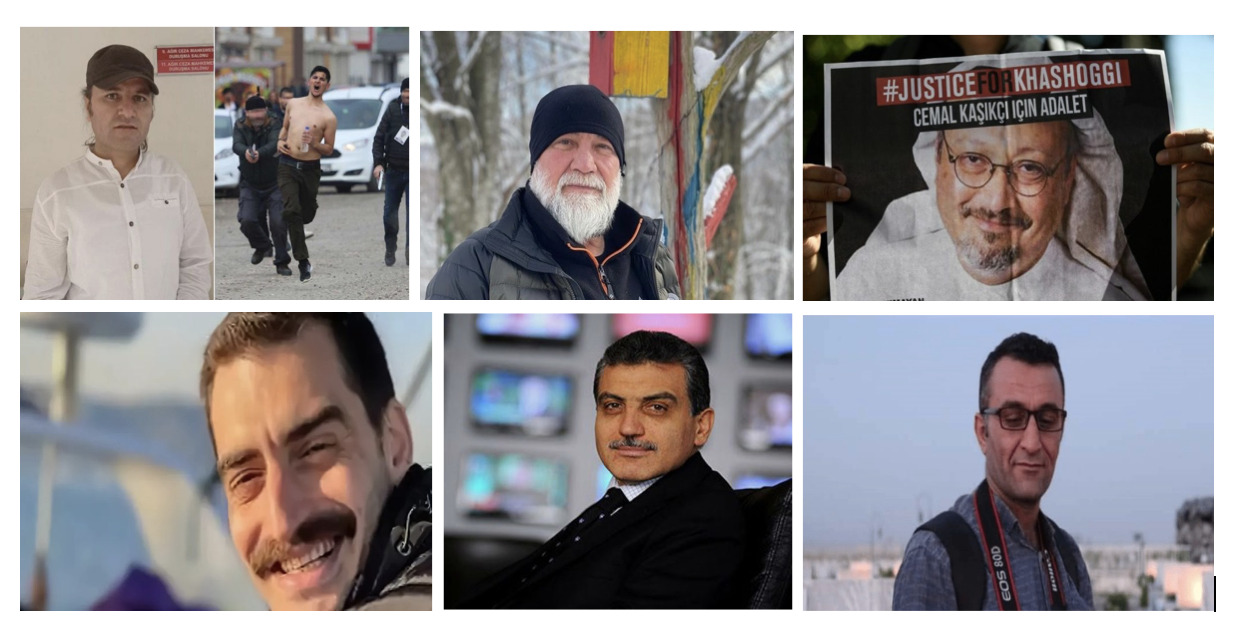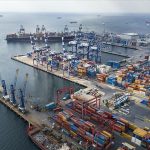The Turkish government renewed its assault on press freedom in 2022 ahead of the 2023 presidential election, including imprisoning journalists, using the regulatory authorities to exert financial pressure and capitalizing on a new media law that mandates prison sentences for spreading disinformation.
Rights groups claimed that authoritarianism continued to gain ground in the country during the year. Most of Turkey’s major media outlets remained under the control of the government.
According to the Committee to Protect Journalists (CPJ), Turkey, among the top jailers of journalists worldwide, saw a significant increase in the number of jailed journalists in 2022, with the government using the media legislation as an additional tool to prosecute journalists. The number of journalists jailed during the year rose from 18 to 40, with 25 Kurdish journalists arrested on terrorism charges.
Journalism is still associated with terrorism in Turkey, and their professional work is used as evidence against journalists in the overwhelming majority of convictions. In most of the trials, the evidence typically comprises social media posts, news stories, articles or TV broadcasts.
According to most recent World Press Freedom Index published by Reporters Without Borders (RSF), Turkey was ranked 149th out of 180 countries in 2022.
Cognizant of these trends, the Turkish government continued to increase its control over social media through restrictive laws. According to a yearly report by Freedom House, internet freedom continued to decline for the fourth year in a row in Turkey, and thousands of online users, including members of the political opposition, faced criminal charges for their social media activities during the period covered.
In October 2022 President Recep Tayyip Erdoğan approved a social media law that stipulates sanctions, including prison sentences of up to three years, for people who are found to have produced social media posts for the purpose of fake news and disinformation.
Moreover, Turkey’s Press Advertising Agency (BİK), the state body responsible for regulating publicly funded advertisements in the media, changed the Press Ethics Code, adding to it vague and abstract wording that is feared to be contributing to the increasing media censorship in the country.
Here is some of the most important news from 2022 in the field of press freedom:
Journalism on Trial
21 journalists detained in southeastern Turkey’s Diyarbakır province
 Turkish authorities in June detained 21 journalists in southeastern Diyarbakır province who worked for pro-Kurdish news outlets JinNews and the Mezopotamya news agency (MA). Among those who were detained were MA’s editor-in-chief Aziz Oruç, JinNews news director Safiye Alagas and JinNews editor-in-chief Gülşen Koçuk. More..
Turkish authorities in June detained 21 journalists in southeastern Diyarbakır province who worked for pro-Kurdish news outlets JinNews and the Mezopotamya news agency (MA). Among those who were detained were MA’s editor-in-chief Aziz Oruç, JinNews news director Safiye Alagas and JinNews editor-in-chief Gülşen Koçuk. More..
Sixteen of the journalists who had been held in custody for eight days were arrested. More..
Journalists Sibel Yükler, Deniz Nazlım and Yıldız Tar were also detained for attending a demonstration in Ankara protesting the arrest of their colleagues. More..
Turkish police detained 11 journalists, including the mother of a 45-day-old baby
 In October Turkish police raided the offices of several pro-Kurdish media outlets as well as the staffs’ private residences, detaining 11 journalists, including the mother of a 45-day-old infant, as part of a “counterterrorism operation.” Eight of the detainees worked for MA and three for JinNews. Mezopotamya’s Ankara correspondent, Zemo Ağgöz, the mother of a 45-day-old baby, was among those detained. More..
In October Turkish police raided the offices of several pro-Kurdish media outlets as well as the staffs’ private residences, detaining 11 journalists, including the mother of a 45-day-old infant, as part of a “counterterrorism operation.” Eight of the detainees worked for MA and three for JinNews. Mezopotamya’s Ankara correspondent, Zemo Ağgöz, the mother of a 45-day-old baby, was among those detained. More..
Nine of the 11 journalists were arrested a week later. The arrests took place after the Turkish Parliament approved a tough pre-election law that could see reporters and social media users jailed for up to three years for spreading “fake news.” More..
Police detained journalist who revealed hack of e-government website
Journalist İbrahim Haskoloğlu, who claimed that a group had hacked Turkey’s e-government website and other government- sites, was detained in April. More..
 Former Taraf daily journalists sentenced to prison for reporting on alleged war plan
Former Taraf daily journalists sentenced to prison for reporting on alleged war plan
Four journalists from the now-closed Taraf daily were handed down prison sentences by a Turkish court on conviction of publishing state secrets in their 2010 reporting on an alleged war plan. More..
Turkey deported Greek journalist ‘for reasons of public order’
Turkish authorities in August deported Evangelos Areteos, a reporter for Greek newspaper Real and author of two books on Turkish politics, “for reasons of public order.” More..
Turkish journalist sentenced to nearly 300 years in prison for smearing al-Qaeda-linked jihadists
 Hidayet Karaca, a prominent Turkish journalist who was accused of defaming an al-Qaeda-linked radical group that endorsed Osama bin Laden and called for armed jihad and the beheading of Americans, was sentenced to nearly 300 years in prison. More..
Hidayet Karaca, a prominent Turkish journalist who was accused of defaming an al-Qaeda-linked radical group that endorsed Osama bin Laden and called for armed jihad and the beheading of Americans, was sentenced to nearly 300 years in prison. More..
Karaca has spent more than eight years in a one-person prison cell. More..
Court handed down sentences to former Zaman daily columnists in retrial over Gülen links
Four former columnists from the now-closed Zaman daily appeared in an İstanbul court in November in the latest hearing of a retrial during which the court handed down prison sentences of varying lengths to the defendants. More..
Turkey arrested TV journalist for insulting President Erdoğan
 Turkey in January arrested well-known television journalist Sedef Kabaş for comments she made on air about President Erdoğan.
Turkey in January arrested well-known television journalist Sedef Kabaş for comments she made on air about President Erdoğan.
Commenting on Erdoğan’s yearslong performance as president during the television program, Kabaş said, quoting a Circassian proverb, “When an [ox] enters a palace, it doesn’t become a king. [However], that palace becomes a barn.” More..
3 political parties filed complaints against journalist for allegedly insulting Turkey
Turkey’s ruling Justice and Development Party (AKP), its far-right ally the Nationalist Movement Party (MHP) and the small, nationalist Grand Unity Party (BBP) filed separate complaints against veteran journalist Ayşenur Arslan. The parties accused the journalist of “insulting Turkey and the Turkish nation” in remarks about the Turkish Resistance Organization (TMT). During a program on Halk TV, Arslan said the TMT was a “semi-official organization known for [carrying out] assassinations.” More..
Documentary filmmaker arrested in Ankara on terrorism charges
Sibel Tekin, a documentary filmmaker and journalist, was arrested in December on terrorism charges . She was detained following a complaint by law enforcement that she deliberately filmed a police car while shooting videos for her new project about daylight saving time in Turkey. More..
Journalist reporting on child abuse in eastern Turkey detained
Journalist Sinan Aygül was detained in December on charges of “inciting hatred and hostility” after reporting on a child abuse incident in Turkey’s eastern province of Bitlis. More..
Photojournalist who captured murder of Kurdish student in 2017 sentenced for terrorist propaganda
 A local court sentenced photojournalist Abdurrahman Gök, who took photos of a university student being shot to death by a police officer in southeastern Turkey in 2017, to one-and-a-half years in prison on charges of “disseminating terrorist propaganda.” More..
A local court sentenced photojournalist Abdurrahman Gök, who took photos of a university student being shot to death by a police officer in southeastern Turkey in 2017, to one-and-a-half years in prison on charges of “disseminating terrorist propaganda.” More..
Transnational repression of journalists
Dissident Iranian journalist who disappeared in Turkey deported to Iran

Mohammad Bagher Moradi, a dissident Iranian journalist who disappeared in Ankara in May, was deported to Iran in early November after being kept in “illegal” detention in Turkey for five months. More..
Turkey arrested 34 Egyptian journalists to accelerate normalization with Cairo
Turkish authorities in November arrested 34 Egyptian journalists who are allegedly members of the Muslim Brotherhood in an attempt to accelerate the process of normalizing relations with Cairo. More..
Turkish court confirmed transfer of Khashoggi murder trial to Saudi Arabia

A Turkish court in April confirmed a halt of the trial in absentia of 26 suspects linked to the killing of Saudi journalist and critic Jamal Khashoggi. The Turkish prosecutor requested that the trial be halted because arrest warrants for the suspects could not be executed and their statements could not be taken. The 59-year-old journalist was killed inside the Saudi consulate in Istanbul on October 2, 2018 in a gruesome murder that shocked the world. More..
Releasing a video on Twitter, main opposition Republican People’s Party (CHP) leader Kemal Kılıçdaroğlu accused Erdoğan of “selling” Turkey’s national sovereignty by handing the case of Khashoggi’s murder over to Saudi Arabia. More..
Violence against journalists
2 Turkish journalists claimed they were receiving threats due to their reporting
Two journalists announced in May that they were receiving threats due to their reporting on an aide to a mafia boss and an Islamic State in Iraq and the Levant (ISIL) militant. More..
Local journalist fatally shot in attack in northwestern Turkey
 Journalist Güngör Arslan, who owned a local news website in Kocaeli province, was fatally shot in February in front of his office. In the last article he wrote for his seskocaeli.com news website on Feb. 18, Arslan criticized Kocaeli Mayor Tahir Büyükakın from the ruling AKP for awarding a public tender to Haldız Construction, a pro-government contractor. More..
Journalist Güngör Arslan, who owned a local news website in Kocaeli province, was fatally shot in February in front of his office. In the last article he wrote for his seskocaeli.com news website on Feb. 18, Arslan criticized Kocaeli Mayor Tahir Büyükakın from the ruling AKP for awarding a public tender to Haldız Construction, a pro-government contractor. More..
Kurdish journalist died in Turkish airstrike in Syria
 Kurdish-Syrian journalist Îsam Hesen Ebdullah died in an airstrike conducted by the Turkish Armed Forces (TSK) on Kurdish militants in Syria in November. Ebdullah, a reporter from the Hawar News Agency (ANHA) who was covering the Turkish airstrikes, was killed, while Mihemed Ceradê, a reporter from Stêrk TV, was seriously injured. More..
Kurdish-Syrian journalist Îsam Hesen Ebdullah died in an airstrike conducted by the Turkish Armed Forces (TSK) on Kurdish militants in Syria in November. Ebdullah, a reporter from the Hawar News Agency (ANHA) who was covering the Turkish airstrikes, was killed, while Mihemed Ceradê, a reporter from Stêrk TV, was seriously injured. More..
Social media and Internet freedom
Erdoğan signed controversial media law critics say will stifle free speech
In October 2022 President Erdoğan approved a social media law that stipulates sanctions, including a prison sentence of up to three years, for people who are found to have produced social media posts for the purpose of fake news and disinformation. More..
Turkey’s ‘disinformation’ bill could irreparably harm free speech prior to 2023 elections: PACE
The Parliamentary Assembly of the Council of Europe (PACE)’s Monitoring Committee expressed concern over a Turkish government-backed bill that criminalizes the dissemination of “false or misleading information” and stipulates prison sentences, saying it could cause “irreparable harm” to the exercise of free speech prior to the 2023 elections in the country. More..
Opposition leader became first politician facing charges under Turkey’s controversial media law
A criminal complaint was filed by the Security General Directorate (EGM) against Kemal Kılıçdaroğlu, leader of the main opposition Republican People’s Party (CHP), after he blamed the government for widespread drug use in the country. It was the first petition targeting a politician based on a controversial new media law. More..
Turkish authorities launched investigation into social media users who posted video mocking Erdoğan
The Istanbul Chief Public Prosecutor’s Office in September launched an investigation into a group of TikTok users who shared a video showing President Erdoğan magically appearing behind them as they count their money. The social media users are accused of insulting the president. More..
Fines and discrimination against critical media
Turkey’s media watchdog gave int’l news websites 72 hours to obtain licenses
 In February Turkey’s broadcasting watchdog, the Radio and Television Supreme Council (RTÜK), gave international news agencies operating in the country a 72-hour deadline to apply for online broadcasting licenses, warning that access to those news websites that fail to obtain licenses will be banned. More..
In February Turkey’s broadcasting watchdog, the Radio and Television Supreme Council (RTÜK), gave international news agencies operating in the country a 72-hour deadline to apply for online broadcasting licenses, warning that access to those news websites that fail to obtain licenses will be banned. More..
Deutsche Welle and VOA challenged RTÜK’s move and announced that they would appeal its decision and take legal action in court. As for Euronews, the news outlet removed the content that necessitated the license and was hence no longer required to secure a broadcasting license.
An Ankara court in July banned access to the Turkish editions of Deutsche Welle and VOA based on a demand from RTÜK. More..
Turkish authorities permanently banned Evrensel daily from publishing public ads
BİK, the state body responsible for regulating publicly funded advertisements in the media, canceled the leftist Evrensel daily’s license to publish public ads, a significant source of revenue for newspapers, on the grounds of bulk buying. More..
RTÜK continued to fine TV stations
RTÜK in May imposed a fine on the pro-opposition Tele1, Halk TV, KRT and Flash Haber TV stations due to the remarks of two opposition politicians on a court decision concerning the anti-government Gezi Park protests of 2013. More..
Also in May Turkey’s broadcasting watchdog imposed a fine on the same four TV stations for airing the remarks of main opposition leader Kemal Kılıçdaroğlu, who claimed that President Erdoğan was planning to flee the country with his family in the event of an election defeat. More..
In October the watchdog fined Tele1, Halk TV and KRT TV for airing debate programs during which the inner workings of an alleged corruption network involving state officials and pro-government figures were discussed. More..
Source:Stockholm Center for Freedom (SCF)



